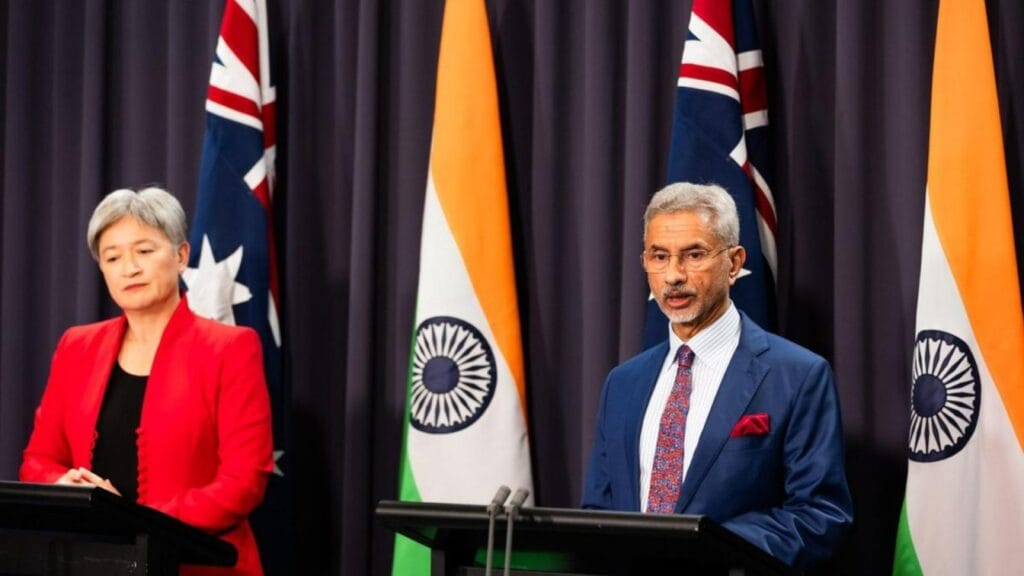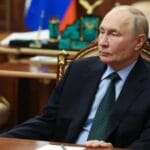Indian External Affairs Minister S. Jaishankar expressed grave concerns over the way the Canadian government has handled extremist groups following a recent attack on a Hindu temple near Toronto. At a joint media conference in Canberra with Australian Foreign Minister Penny Wong, Jaishankar described the incident as “deeply concerning” and said Prime Minister Narendra Modi and the Indian government felt very much about the issue.

He said this is a pattern of giving “political space” to extreme forces, pro-Khalistan radicals being one such force, and that is growing. He was responding to an attack on a Hindu temple in Brampton, Ontario, carried out by these radicals. The spree of attacks on minorities was his point, and he said that while India respects freedoms, those freedoms should not be used to support violence and extremism. This seems to be a fair assertion; when any nation leaves enough open space for the voices of extremists, it tends to put the communities at risk.
Concluded the 15th India – Australia Foreign Ministers’ Framework Dialogue with FM @SenatorWong in Canberra today.
Our Comprehensive Strategic Partnership is growing steadily. Reflected in stronger political ties, robust defence & security cooperation, expanded trade, greater… pic.twitter.com/SWCqV0T49l
— Dr. S. Jaishankar (@DrSJaishankar) November 5, 2024He said serious allegations are being thrown against India without a shred of evidence. He pointed toward the claim by the Canadian government that Indian officials were associated with the murder of Khalistani separatist Hardeep Singh Nijjar. According to Jaishankar, these allegations have not been substantiated, and he expressed frustration over the surveillance of Indian diplomats in Canada, which he deemed unacceptable. It’s quite troubling to see diplomatic relations sour to this extent, and it raises questions about how countries can work together to maintain safety and security.
Prime Minister Modi condemned the temple attack and asked the Canadian government to deliver justice. He echoed those sentiments because there’s a need for the Canadian authorities to enforce the rule of law. In his statement, Jaishankar points out an important lesson in diplomacy: though nations are different, the supreme expectation would be that all governments protect their citizens from violence and dispense justice.
I strongly condemn the deliberate attack on a Hindu temple in Canada. Equally appalling are the cowardly attempts to intimidate our diplomats. Such acts of violence will never weaken India’s resolve. We expect the Canadian government to ensure justice and uphold the rule of law.
— Narendra Modi (@narendramodi) November 4, 2024On the Canadian side, Wong responded to allegations against the Indian government and said Australia respects the judicial process of Canada. She emphasized the commitment of Australia to the rule of law and sovereignty of all nations. Countries need to hold on to principles like this, but I am not sure if there is enough diplomatic effort to resolve these tensions without further escalation.
READ | Canada Labels India a Cyber Threat, Escalating Diplomatic Tensions
She also referred to the recent vandalism incident on two Hindu temples in Canberra that took place in the recent festive season of Diwali. She said such incidents are an emotional blow to the Indian community in Australia and any Australian, irrespective of his religion or culture, must be able to live safely and with dignity. I feel it is relevant for harmony in the multicultural setup in Australia.
It further escalated into tensions between Indian and Canadian governments since Prime Minister Justin Trudeau accused Indian government agents of involvement in the killing of Nijjar, who was designated a terrorist by India. Since Canada sought to question Indian diplomats as “persons of interest” in the case, India withdrew its diplomats and expelled six Canadian officials.
As an observer of these developments, I do believe that the situation calls for careful navigation. Both countries have much to lose from continued conflict, and it would be in their best interest to seek a diplomatic resolution. Open communication and a commitment to shared values can pave the way for more positive relations moving forward. After all, peace and security for the respective stakeholders in this relationship demand that, at least, peace and security should be a priority between the two states.
Minutes by M31GlobalNews






